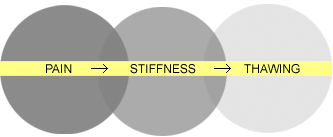
If shoulder pain and immobility are keeping you awake at night or from the daily activities you love, you are not alone. Every year, more than 4 million Americans seek medical attention for common shoulder problems such as torn rotator cuff, tendinitis (tendonitis), frozen shoulder or arthritis.
Fortunately, recent medical advances can help diagnose and treat these and other shoulder pain problems.
Many patients suffer from "frozen shoulder" which physicians refer to as adhesive capsulitis, or on occasion, bursitis or tendonitis. This is a rather unusual problem that occurs in the shoulder and results in stiffness, loss of motion and often substantial pain.Definition of Frozen Shoulder:
A frozen shoulder is a shoulder joint with significant loss of its range of motion in all directions. The range of motion is limited not only when the patient attempts motion, but also when the doctor attempts to move the joint fully while the patient relaxes. A frozen shoulder is also referred to as adhesive capsulitis.
Symptoms of 'Frozen Shoulder:
The pain of frozen shoulder is accompanied by loss of motion or stiffness. This may cause you to severely restrict your movement. The symptoms usually develop gradually over weeks or months. You may find that:
- Pain is most severe during the early stages of the condition.
- Pain is usually worse at night.
- As pain decreases, stiffness and immobility increase.
- Pain may travel from the shoulder down to the elbow.
- A "thawing phase" occurs, during which time the condition may improve on its own.






No comments:
Post a Comment